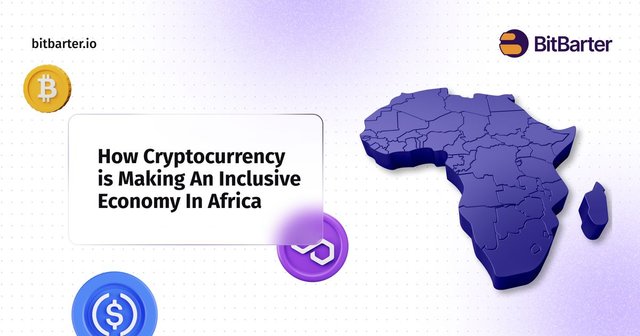How Cryptocurrency is Making An Inclusive Economy In Africa
The adoption of crypto in Africa is contributing to Africa's potential as one of the world's richest and most influential continents.

Welcome to Africa! A continent of 54 countries, and according to research by the UN environment program, a continent with 40% of the world’s gold and up to 90% of its chromium and platinum.
Science, artificial intelligence, and cryptocurrencies have created a more technologically advanced world, making life easier and more meaningful to the ordinary man.
A Glimpse at the African Economy
Africa has witnessed a high degree of solvency and stunted growth in its economy. In fact, recent research from the United Nations expresses that the estimated average economic growth in Sub-Saharan Africa during 2023 will drop to 1.4% after averaging 1.6% in 2021 and 2022.
This is due to a slowdown in global growth, adverse weather conditions, natural disasters, rising inflation exacerbated by the war in Ukraine, and the increasing risk of debt distress. These factors, according to the UN will keep poverty entrenched on the continent and prevent countries from accelerated progress toward the Sustainable Development Goals.
The Way Out
Cryptocurrencies have proven to be a better way to savor the African economy from mishaps. The bull run in 2020 escalated the massive adoption and belief in cryptocurrency by African people who were trapped in depression, low self-esteem, and poverty prior to the Bullrun.
Key thought leaders from so many different parts of Africa have also attested to the efficacy of cryptocurrency. Most of them even made it a mandate to teach others and educate their fellow Africans as a means to eradicate poverty in the economy.
To this end, we have seen several African countries like Botswana, Ghana, Kenya, South Africa, Tanzania, Uganda, Zimbabwe and Nigeria that have made plans at various stages of crypto regulation and issuance of CBDCs.
The African Market
Africa has become one of the fastest-growing crypto markets in the world. In fact, according to Chainalysis, crypto transactions across the African continent reached a peak of $20 billion per month in mid-2021, with the highest number of users sprouting from Nigeria, Kenya and South Africa.
However, it still remains the smallest, because in Africa, cash is a significant form of payment and this has been a limiting factor towards the growth of the African economy even among its member states.
Africa consists of about 54 countries and these countries all have their sovereign currency. Unfortunately, you can hardly spend one African cash currency beyond its sovereign state.
However, this also prompted a massive campaign to educate many African people about the potential of blockchain technology and cryptocurrencies.
How Cryptocurrency Is Making An Inclusive Economy In Africa
Bridging the gap between inter-state currencies: Digital currencies in the African economy eliminate the need to carry unspendable currencies around. People can easily move to another African country without worrying about their currency.
Cashless Economy: The African market is very big and offers many opportunities for businesses. Little wonder why several companies have their branches in Africa. Cryptocurrency comes in handy in a bid to ensure the safety and modernization of funds and to regulate cash flow. Businesses can engage in transactions without the need to move large amounts of physical cash around. Some businesses have also begun to accept crypto as a payment option.
Inflation control: Investing in cryptocurrencies is a recommended strategy to hedge against inflation. For example, Bitcoin has a total supply of 21 million $BTC and every four years the amount of bitcoin that is mined is reduced by half (burned). That way, scarcity(an important quality of money) is induced, making it a better store of value, unaffected by the government’s policies.
Improving financial inclusion: Africa has both the human and natural resources to create wealth. Unfortunately, there’s a significant income gap that’s widening. Cryptocurrency is helping to bridge that gap by offering everyone a level playing field and onboarding over 8m Africans into the ecosystem. It has created massive job opportunities for people with varying skills and the most exciting part is that you need little or nothing to get started.
These are the ways by which cryptocurrency is making an inclusive economy in Africa.
How BitBarter Is Using Crypto To Create A Financial Bridge
https://bitbarter.io/ uses a peer-to-peer network that facilitates transactions through crypto. Transactions are processed quickly, securely and at a minimal cost, making them more efficient than traditional banking systems.
The benefits of using BitBarter's system are numerous. Firstly, it is more accessible to people who are underserved by traditional banking systems. This is especially important in Africa, where millions of people lack access to basic banking services.
Secondly, it is more secure and transparent. With our Bitcode solution, users can send/receive money using an email address, reducing fraud risk and driving inclusivity and crypto adoption for everyone.
In Summary
With good knowledge of blockchain technology and the adoption of cryptocurrencies in the African economy, there is no doubt that Africa stands a good chance to be one of the world's richest and most influential continents both in natural resources, human resources, technological advancement and modernization.